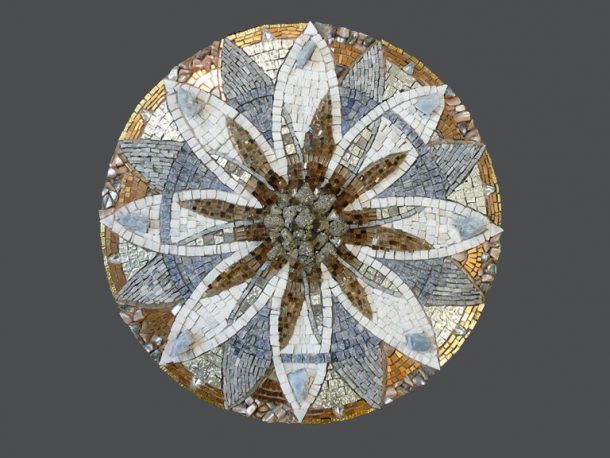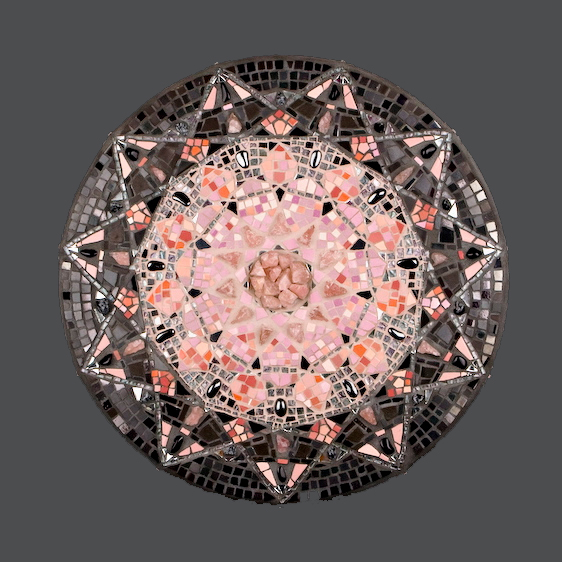Ancient patterns at the foundation of the highest levels of science and technology
By Kathryn Kukula
UPDATE: The Lod Mosaic is touring internationally, with stops in NYC>San Francisco> Columbus OH>, Philadelphia PA>, Paris> Berlin> United Kingdom> and Moscow, before returning to it’s original site in Israel slated for 2015. Resources and a video at the end of this article.
– – – – –
Looking at the Lod Mosaic, on view at Chicago’s Field Museum from December 9, 2011 until April 2012, brings to mind the question:
Why such an elaborate, lively design for a floor?
San Francisco-based mosaic artist and scholar Lillian Sizemore has some provocative and stimulating answers.
The Lod Mosaic is a pavement dating from 275-300 AD that was discovered in Lod, Israel, in 1996. “It shows how the Romans were assimilating Greek philosophy as they conquered the Mediterranean world,” says Sizemore, who has lectured extensively on Roman mosaics.

Nationally touring Lod Mosaic moves to Field Museum in Chicago Dec. 9th – the Roman pavement has toured from the Metropolitan Museum, NYC, and Legion of Honor, San Francisco
Sizemore explains that ancient Greeks and Romans used the geometric shapes they saw in nature as a foundation for learning. “By harnessing natural shapes and combining them with images of animals, the creators of the Lod Mosaic made their pavement both decorative and perhaps, philosophical,” says Sizemore. To the initiated, these patterns provided access to the highest levels of thinking and contemplation. As with the patterned mosaic floors in cathedrals, mosques, and temples around the world, one can stand on this pavement and experience the infinite. “The wealthy merchant who commissioned this floor made quite a statement when he placed this contemplative instrument in his reception hall,” says Sizemore.

In her lectures and demonstrations, Sizemore uses animated illustrations and folded models of the floor to reveal how the geometry and imagery work together. “I recognized the geometry, but it was only when I imagined the floor three-dimensionally that the mosaic took on a whole new meaning,” says Sizemore. On the pavement, birds, fish and animals strut and swim in geometrical frames of elaborate and detailed interlocking guilloche borders. When Sizemore folds her model of the floor to create a globe, the birds and fish appear in three-dimensional shapes pointing up to the sky and down to the waters; the mammals hunt in squared frames, grounding the design in an earthly network. Says Sizemore, “Standing on the floor puts you literally in the center of the universe”

Sizemore holds her original model of a stellated Great Rhombicuboctahedron Archimedian Solid, made from the existing geometries of the central panel of the Lod Mosaic.
Sizemore points out that the contemplation and manipulation of geometry remains at the foundation of science and technology. For example, in 2010, two scientists won the Nobel Prize in Physics for their creation of graphene, a material just one atom thick that is composed of a lattice of hexagonal honeycomb-shaped molecules. “Hexagons are inherently efficient,” says Sizemore. “It’s the underlying geometry that gives graphene extraordinary properties that may revolutionize electronic circuits, sensors, and solar cells.”


Sacred Geometry meets Nanotech: Hexagonal Graphene, only one atom thick
Hearing Sizemore’s lecture on the geometry of the Lod Mosaic gave many listeners an “aha” moment of their own.
M. Bottaro commented:
“Thank you for your thoughts about sacred geometry and how it appears in the Lod Mosaic. I might have simply assumed “Noah’s Ark” before hearing your lecture, and would have satisfied myself by enjoying the lovely patterns.”
Liz Williams wrote:
“Now I understand more why I had so much trouble walking away from that mosaic. I felt lonely when I got too far from it, and happy and full when I was looking at it.”
UPDATE: View Sizemore’s Educational VIDEO and go in-depth on the LOD MOSAIC.
In this fascinating journey, Lillian explains the mosaic’s symbolism and construction and introduces her revolutionary research that the flat pavement was imagined as a three-dimensional sphere. Join Lillian as she decodes the underlying mysteries of this spectacular 1700 year-old Roman pavement excavated in Lod, Israel.
So get comfortable and prepare to be inspired!
Recommended View: FULL SCREEN + SOUND ON
Run time: 19:27
[vimeo http://www.vimeo.com/36707112 w=500&h=281]
– – –
CALENDAR of PAST EVENTS
Live Mosaic Demonstrations
Saturday, December 10
at THE FIELD MUSEUM
11 AM to 3 PM in the Marae Gallery, 2nd floor
Professionally trained artist, Lillian Sizemore, demonstrates her mosaic methods, using the classical hammer and hardie cutting technique. Display includes examples of various methods and materials highlighting the ancient roots or “grammar” of mosaic making. Finished artworks, work in progress, tools, books and a resource hand-out are featured.
Lecture: “Lod 2.0: Above and Below”
Monday, December 12
7 PM to 8:30 PM
AT the CHICAGO MOSAIC SCHOOL
Lod Mosaic at the Field Museum, on view from Dec. 9, 2011, to April 2012.
The Lod Mosaic then travels to Columbus, Ohio; and Philadelphia, Pennsylvania.
Where: The Field Museum 1400 South Lake Shore Drive, Chicago, IL 60605
Hours: 9 a.m. – 5 p.m. Last admission at 4 p.m. Open every day except Christmas
Museum Admission Tickets: $10- $15
Contact: www.fieldmuseum.org
General Info: (312) 922-9410
For more on the Lod Mosaic: http://www.lodmosaic.org
In February 2013, “Unearthing a Masterpiece” the Lod Mosaic moves to University of Pennsylvania Museum of Archaeology and Anthropology, Philadelphia PA. More info HERE

Upper Panel of LOD MOSAIC


Thank you, Lillian, for deconstructing the complexity in the simple presentation of the Lod Mosaic. As I always think about the integration of art and science and math, this hits the nail (tessara) on the head. Brava!
You clever thing, that is such a revelation to me. so does that infer that there was a 3d version somewhere?
thanks Allan! I doubt there was a 3-D “mosaic”.
thank you Ariel. the intersection of art/math/science is bountiful, isn’t it?